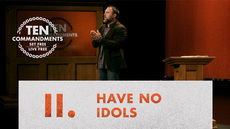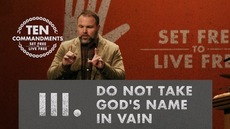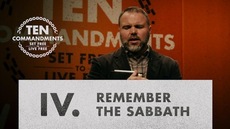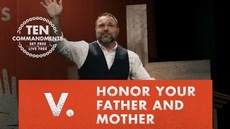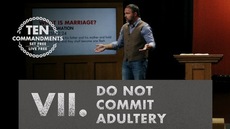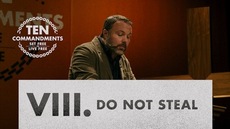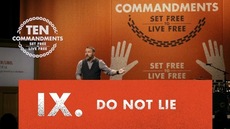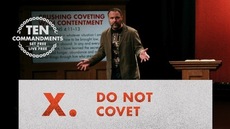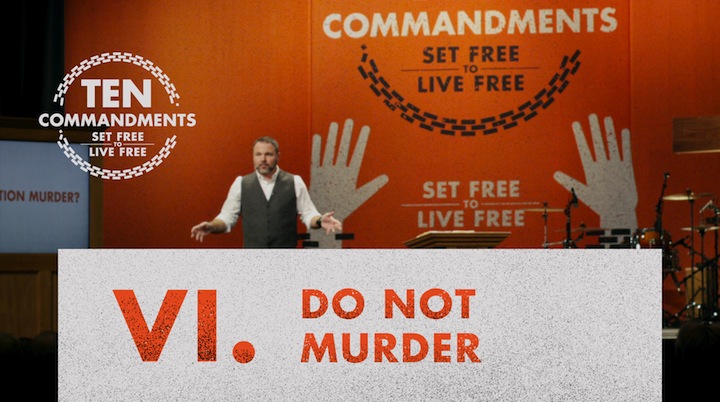
Can’t see the video? Download and install Flash to be able to view. Get Flash Here
The sixth commandment consists of two words in the Hebrew, “no” and “murder.” While the first word is not really debated, the second is. This sermon examines the meaning of “murder” in the Bible and discusses its implications for the issues of capital punishment and abortion.
13 “You shall not murder.
The Holy Bible, English Standard Version copyright © 2001 by Crossway Bibles, a publishing ministry of Good News Publishers. Used by permission. All rights reserved. Quotation information.
Today, we decide who lives and who dies. Open your Bibles. We’re going to be continuing our series in the Ten Commandments. Today, we find ourselves in commandment number six, in Exodus 20:13. Here’s the commandment. We’ll read it together—it’s very simple and very complicated: “You shall not murder.”
This was originally written in Hebrew. It’s been translated into English; don’t let that bother you. This is the best translated book in the history of the world. It’s actually two words, “No murder.” The first word, not really debated. My entire sermon will be on the second word. We’re going to spend the better part of an hour together looking at the meaning and implications of one word in the Bible, because all Scripture is God-breathed and profitable, and Jesus said that every single word matters and counts, and arguably, very few matter as much as this word.
There are some eight different words that I found in the Old Testament studying this week that referred to killing of various sorts and kinds. The question is, what does God mean exactly by murder?
Part of the confusion comes in the King James Translation of the Bible, which is another good English translation, but it’s older style of English. It’s an older translation. It says, “Thou shalt not kill,” and most people are familiar with the sixth commandment in the terms and the language of the King James Bible—“Thou shalt not _kill_” (emphasis added).
What this could lead to is all kinds of false thinking: you should never defend yourself; you should hold a position of extreme pacifism; if someone breaks into your home, you should let them harm your family rather than take their life. Those kinds of things are the implications of the misunderstanding of one word of the Bible.
God is not a pacifist. The Bible does not present God as a pacifist. Only a very selective, prejudicial reading of some of what the Scriptures say could lead you to that position. The Bible does not tell us, “Thou shalt not kill”; it says that we should not murder. Not murder.
And so this word is very important. It refers to such things as manslaughter, violent and unauthorized killing, personal vengeance and revenge, and yes, just good old fashioned murder.
So, we’ll use a few examples. You tell me whether or not this constitutes murder: accidental death, self-defense, a soldier in a just war, a police officer returning fire. Yes or no, that qualifies as murder. No. No. How about infanticide, suicide, physician-assisted suicide, euthanasia, and acts of terrorism? Does that constitute murder, yes or no? Yes.
So there are ways that taking a life is justified. There are ways that taking a life is unjustified, and part of the complexity is we can’t simply say, “You should never kill anyone,” but the truth is, we want to put some restrictions on that so we don’t have mass murder, terrorism, anarchy, unjust war, and the state out of control, slaughtering innocent civilians.
So, we’re going to unpack exactly what God means by this word—that there are occasions when human life is to be taken, but those occasions are rare and they are specified by God himself.
I’m sure this leads to a number of questions, and my hope today—and this is going to largely be an emotionally expensive time of instruction—is to answer some of the more common questions and objections around the sixth commandment.
Here’s one of the first and perhaps the most important: why is murder wrong? We live in a day of situational ethics where we believe that it is not God who is the center, but we are the center; that laws are not binding all peoples, times, and places; that ethics are situational; that we do not turn out to find the truth, but we turn in.
And so we find authority to be internal instead of external. What we’re finding in the Ten Commandments is that the way that God is trying to orchestrate and organize our hearts, our lives, our minds, and our cultures is God-centered with laws and truth that is external.
Here’s why: God is the author of life. God is the one who is sovereign over life. God has all authority over human life. That’s exactly what it’s going to say in Genesis 9:6, “Whoever sheds the blood of man, by men shall his blood be shed, for God made man in his own image.” In the previous book of the Bible, in the book of Genesis, it says you should not kill anyone—murder anyone, to be more specific—and if you murder someone, then you should be murdered because people bear the image and likeness of God.
So, this is biblical thinking; this is not evolutionary thinking. In evolutionary thinking, human beings are just lucky animals. In biblical thinking, they are image-bearers of God. All the way back in Genesis, God made animals, and he loved them, he provided for them, he cared for them. It talks about the birds of the air, the beasts of the field, and the fish of the sea in the Scriptures. But then, God makes man and woman alone in his image and likeness, so human beings are in a category below God and above the animals.
This is a sermon. We’re going to get into politics, anthropology, and history, and we’re going to get into ethics, and theology. We’re going to go a lot of directions. This is the anthropological portion of the sermon: there is God above us and animals beneath us, and we occupy a place under God and over animals.
Those who are exclusively evolutionary in their thinking don’t believe that. The founder of the organization P.E.T.A., People for the Ethical Treatment of Animals, had a famous phrase: “A pig is a dog, is a rat, is a boy. A pig is a dog, is a rat, is a boy.” We don’t believe that. I’ve got five kids and a German shepherd. We love the German shepherd, I’m nice to the German shepherd, I don’t believe in animal cruelty, I even feed it treats and play Chuckit! with the dog, so I’m—OK, so all you people who are liberals, who just come along for the ride, I have a pet that I’m nice to, OK?
But if my house was on fire and I ran in, let’s say four of my kids got out and one was still in, and there was the child and the dog and I could only get one, what I would not do is flip a coin. If I could get both, I would get both. If I could only get one at a time, I would get the child first and try and go back for the dog. If it was down to the dog or the child, I would no longer have a dog because the child bears the image and likeness of God, and the animal does not.
It doesn’t mean we should mistreat animals or be cruel to them—not advocating that at all, but I’m saying that human life is of higher value than animal life. There’s no indication that an animal has a soul. There’s no indication that Jesus died for animals. There’s no indication that animals will receive the resurrection of the dead and the eternal kingdom of God.
But human beings bear the image and likeness of God. Jesus died for people, and people will be judged by God and live forever because they possess a soul. They’re not just material; they’re immaterial. We endure forever, for life or for death, that people alone bear the image and likeness of God.
So, when it comes to the issue of murder, God says, “Don’t kill anyone,” not because, well, that’s not nice or, you know, that’s rude or that’s inconsiderate. It’s actually a bigger issue than that—“because they bear my image.”
So, to murder a person is not only to do violence against the person, but to do violence against the God who made them. This is where the Bible does not distinguish between those things that are sinful and those things that are criminal when it comes to the Ten Commandments. To murder is not just a civic, social issue, but it’s a God issue. It’s an offense not just against the person, but it’s an offense against God who made them in his image and likeness. So, when you murder a person, you’re also declaring war on God because you’re attacking the person who bears the image that he bestowed on them.
Some of you are going to be very inconsistent. You’re going to argue for animal rights and abortion. You’re going to argue for treating people kindly while holding to an evolutionary position that says that only the fittest survive, and that those who are weak, elderly, infirm, struggling, or poor, that perhaps they should be killed because, after all, they’re a burden to the rest of us.
God says, no, people are made in his image and likeness. They bear particular dignity, value, and worth. They are to be treated with love, value, equality, justice, and respect. And let me just say this, if you don’t believe the Bible, you have no right to be yelling about tolerance, diversity, and justice. You’re just a hypocrite to your own worldview. If might makes right, if the fittest survive, and we’re no more than lucky animals, then stop whining. And if you would like justice, if you would like equality, if you would like dignity, well then, believe the Bible, because apart from the anthropology of the Bible, you do not get equality, dignity, and value for human life. You just don’t. You can’t. You can’t.
Well, when it comes to this issue of murder, this is actually a demonic issue—it’s not just a social issue. Jesus says in John 8:44 of a certain group that want to kill, murder him, “You’re like your father. Your father is the devil and he’s been a murderer since the beginning.” Murder is a demonic issue. God makes life, and Satan takes life. Satan loves it when people are put to death wrongly, prematurely, and unjustly. Jesus says, “In the beginning, the Father made us, and in the beginning, Satan was a murderer.”
It harkens all the way back to the first two brothers. What are their names? Cain and Abel. Abel was a godly man. His brother, Cain, murdered him. Murder begins with the first two brothers. Murder has a long history in the world, and Jesus says, “This is demonic; this is what Satan does.” He is trying to get people to kill one another, and he’s been that way since the beginning.
Well, today, we have become so adept at murder that we’ve actually created words like genocide to explain mass murder. Those of you who think that we are good, let me just submit to you that every technological innovation tends to be for the subjugation or termination of other people. We may be advancing technologically, but we’re not advancing morally, so we use technology to murder more efficiently.
So, we create words like genocide for Bosnia, for Rwanda, for Nazi Germany. We have ideology like ethnic cleansing, which is the result of evolutionary thinking. These people are more evolved than these people, so we should kill them, murder them. The result has been four men taking 175 million lives in the 20th century. Four men taking 175 million lives in the 20th century. The 20th century is the most bloody in the history of the world.
Those four men: Hitler, Lenin, Mao, Stalin. Bible-believing, evangelical, Jesus-loving Christians, yes or no? No, atheistic Communism and various aberrations of it. You don’t come from God; you don’t have particular dignity. God is not in charge; the state is. God is not sovereign over life; the state is. And the state has the right to just end the lives of any people that it deems are unwilling, unequal, or unfit, for any reason.
That is more people than the UK and France combined. That’s about roughly two-thirds of the population of the United States of America, murdered by four men overseeing governmental regimes.
Proverbs has a great line. I’ll read it to you. It’s Proverbs 8:36. God says this: “All who hate me love death.” The further you get away from the God of the Bible and thinking like the God of the Bible, the more prone you are to move toward murder. The more you read your Bible, the more you have the mind of Christ, the more you will be pro-life.
Some of you would say, “Pastor Mark, I see where this is going, and I disagree with you.” No, you don’t; you disagree with God. And I don’t want to overstate my case. I would say, though, that what we’re dealing with is an increasingly desensitized culture to murder. By the time they graduate from high school at age 18, the average young adult has witnessed—between television, video games, and movies—80,000 murders.
Some of you say, “Well, it’s not real.” True or false, some movies are very realistic, some TV shows are very realistic, and increasingly, some video games are very realistic? To see 80,000 murders, I would submit to you, has the strong potential of desensitizing someone to the horror of murder and to the sanctity of life.
It leads to another question: can the state take a life? I just told you about states that do so in a way that is godless, unjust, and wrong, and that certainly happens. The answer to an abuse of authority is not an absence of authority, but the right use of authority.
So, God not only tells us not to murder individually, he gives commands to governments nationally. One of them we find in Romans 13:1–4: “Let every person be subject to the governing authorities.” These are political leaders. “For there is no authority except from God, and those that exist have been instituted by God. Therefore whoever resists the authorities resists what God has appointed, and those who resist will incur judgment. For rulers are not a terror to good conduct, but to bad. Would you have no fear of the one who is in authority? Then do what is good, and you will receive his approval, for he is God’s servant for your good. But if you do wrong, be afraid, for he does not bear the sword in vain.”
Here’s what the Bible teaches: God is in ultimate authority, and he has delegated some authority to the state. Apart from a biblical concept and notion of a sovereign God, what you end up with in the absence is either the sovereign individual or the sovereign state. The sovereign individual is, everyone does whatever they want. The book of Judges talks of this, saying, “Everyone did what was right in their own eyes.” It’s either sovereignty of the individual or sovereignty of the state. The government is in highest authority and then has a tendency to abuse its authority because government is run by sinners.
So it’s either sinners are in charge of their own life, or sinners collectively in a governmental capacity are in charge of our collective lives, or God who is sovereign over everyone and everything, and he’s the one in the position of highest authority.
The Bible teaches that God is in the position of highest authority, and that God speaks to us through his laws, and that God’s laws are binding on all peoples, times, and places. That’s how we get true justice; that’s how we get true equality. Those things that those who would hate God cry out for are things that only God can provide—justice and equality—and it comes through laws that oversee all nations, times, places, races, cultures, peoples, and sexual orientations—yes, I said it. And that God calls people to repent and to live in obedience to his commands.
And then all other authority is not innate authority. A government does not have innate authority. A father does not have innate authority. A pastor does not have innate authority. A professor does not have innate authority. A business leader does not have innate authority. All authority, then, is derivative authority. It’s borrowed from God; it’s on loan from God.
Then leaders are bearing particular responsibility to operate, to lead, to make decisions in such a way that honors and agrees with God and his word, his laws, and his ways—and that includes the state. God hands the state a sword to oversee its citizens, to bring justice. This is not just the taking of life, this is the creating of a context in which life is sacred so that life can flourish.
So, this leads to two tangential questions. Capital punishment—does the state have a right to, on occasion, according to the teaching of the Bible, enact capital punishment, taking the life of one of its citizens, yes or no? Yes. There are over two dozen, in Old Testament, occasions in which capital punishment was sanctioned by God.
Now, some of you say, “Well, the courts are imperfect, and mistakes were made,” and I would say, “I agree with you.” Any system than includes sinners will have flaws. The answer is not to not have a system for justice, but to always be working on that system of justice to bring it in accordance with God’s standards of justice.
Yes, God does delegate to the state, based upon Romans 13 and the example of the Old Testament, the right for capital punishment. This is to discourage vice and to promote virtue. This is to say that there is such a significant consequence for certain law-breaking that it should help maintain some civic, social order.
Imagine today if we got rid of all the police officers, all the courts, and all the jails. That would not lead to human flourishing and life. That would lead to anarchy and death. And so that threat of punishment helps to keep some unrepentant sinners restricted in their conduct.
In addition, this also helps to mitigate against person vengeance. If you can’t call the police, and if you can’t get your proverbial day in court, and if there’s not a prison system or capital punishment, what you’re going to do is to try and take justice into your own hands—vengeance, retribution.
The result is a very dangerous culture in which angry people take lives. And if there’s a process for which justice can be pursued, that helps to mitigate that kind of personal vengeance.
So yes, God does sanction capital punishment. He does. And don’t let the universalistic, pacifistic, false Bible teachers tell you, “Jesus was totally nice. All he ever did was turn the cheek.” The Jesus of the New Testament is the God of the Old Testament, and I’ll tell you, it’s one bloody book. It’s one bloody book. The animal rights activists don’t like the sacrifice of animals foreshadowing Jesus. Those who are pacifists do not like the fact that God’s people are given commands. Those commands do include permission to have capital crimes tried and punished with, yes, even capital punishment.
Not only that, God himself in the Old Testament kills a lot of people. He floods the world in the days of Noah. He sends fiery road tar out of the sky for Sodom and Gomorrah, obliterates two perverted, adjoining towns. It’s a bloody book. It’s a bloody book.
Sometimes those people who would say, “I don’t think that God has the right to take life,” it’s because they’re the criminals, and criminals never like justice.
The second question that comes up practically is, what about war? Does the state, does a government, does a nation ever have a right to go to war, yes or no? Yes. You see this in the Old Testament. I’m not saying we’re theocratic Israel, but there are occasions where God’s people go to war, and there are even war heroes in the Bible like King David. He’s celebrated for his ability to kill a lot of men.
Now, historically, studying the Scriptures in their totality, not proof-texting, biblical Christian theologians have come up with something called the concept of just war. And this is to say that, yes, certain wars are murderous, but others are not.
Generally speaking, there are some conditions, like, is it a legitimate authority, meaning, is it a government, or it is just a band of rebels, anarchists, or terrorists, not a legitimate authority?
Is it defensive, not offensive, are you not the one who is instigating hostility but are defending your citizenry?
Number three, is it for a noble cause? If it’s just because it could affect your GDP, might I submit that is not entirely a just cause.
Is it proportional force? All right, if we drop a nuclear bomb on 27 terrorists, that’s not proportional force. We send in the Navy SEALs for that.
Are soldiers and not civilians targeted? Are there a bunch of innocent people who really are caught in the middle but not the source of the trouble?
Number six, does it ultimately preserve more lives than it takes?
And number seven, is it a last resort? We’ve tried diplomacy and everything we can conceive of.
Admittedly, these are difficult decisions. Theologians will debate every time a nation goes to war whether or not it constitutes a just war. In an age of terrorism, in an age of nuclear weaponry, in an age of preemptive first strikes, I’m not going to pretend that this is not complicated. That’s why the Bible says that we need to pray for our leaders. We need to pray that even if they don’t know the Lord, that they may have some wisdom from the Lord, because that’s what these kinds of cases require.
So, who have we offended thus far? Animal rights activists, pacifists, peace-niks—we’ll just call them hippies, all right; we’ll just simplify. But murder is what we’re talking about, and it’s important to talk about it, and I would encourage you not to think, “Oh, well, these are political issues.” Actually, they’re not. They’re theological issues. They’re life-and-death issues. They’re very important issues, with some political implications.
Here’s the hardest part of the sermon. This is where I will spend a great deal of time. Many of you will want to leave right now. Hundreds of you will probably leave and never return. I would encourage you to consider what I have to say, to go home and study what the Word of God has to say, and do not make a hasty decision, but make a prayerful, careful, biblical decision about this following issue.
Here’s the question: in regards to murder, is abortion murder? The issue is not choice; the issue is murder. Don’t let semantics confuse you. Do you not believe in choice? I don’t believe in murder. What we’re talking about is not choice but murder. When does life begin? Friends, life begins at conception. Scientifically and medically, it’s incontrovertible. It just is.
I’ll read something to you; I brought a few quotes. Robert P. George, Princeton professor, former member of the President’s Council on Bioethics, “Human embryos are not some other type of animal organism like a dog or a cat. Neither are they part of an organism like a heart, a kidney, or a skin cell. Nor again are they a disorganized aggregate, a mere clump of cells awaiting some magical transformation. Rather, a human embryo is a whole living member of the species, Homo sapiens, in the early stage of his or her natural development. Unless severely damaged, or denied, or deprived of a suitable environment, a human being in the embryonic stage will, by directing its own integral, organic functioning, develop himself or herself to the next more mature development stage, i.e., the fetal stage. The embryonic, fetal child in adolescent stages are stages in the development of a determinate and enduring entity, a human being, who comes into existence as a single-celled organism, called a zygote, and develops, if all goes well, into adulthood many years later. But”—here’s our question—”does this mean that the human embryo “is a human person of full, moral respect? Must the early embryo never be used as a mere means for the benefit of others simply because it is a human being?”
The answer is, yes, life begins at conception. It may be a little person, but it’s a person made in the image and likeness of God, and every mother who’s had an ultrasound knows this.
I’ve been present for the ultrasound of five of my children. One of the things that has helped erode and undermine this strong commitment to abortion is the innovation and the distribution of the ultrasound. Once you see, you see it’s a baby. I’ve been there, all five of my kids. “Oh, there’s the head. There’s the arms. There’s the hands. There’s the feet. Do you see the heart? Oh look, five fingers on that hand and five fingers on that hand, and five toes on that foot and five toes on that foot.”
Guess what it is? It’s a person. That’s why those who are pro-death fight against showing ultrasounds to pregnant women considering an abortion, because they know that it will affect their decision, as the truth always does. Scientifically, medically speaking, life begins at conception. Biblically, life begins at conception.
Let me give you seven reasons why I believe why life begins at conception, God says. It really doesn’t matter what I believe. It matters what God says.
Psalm 51:5 says that we are sinful from our mother’s womb. So, a baby in the womb is not just a person, they’re a sinner. They’re just waiting for an opportunity to show this fact is true, OK, and the birth provides that opportunity. They’re a sinner who needs a Savior. So, you understand that only a human being in the Bible is called a sinner. All right, it’s people that are sinners, and people need a Savior.
Number two, Isaiah and Jeremiah, two great Old Testament prophets, both tell us that they were called for their prophetic ministry from their mother’s womb. They were set apart for prophetic ministry from their mother’s womb.
In Luke 1:15—this is point number three—John the Baptizer, we are told—this is Jesus’ cousin—“will be filled with the Holy Spirit even from his mother’s womb.” So, a baby in their mother’s womb is a sinner who needs a Savior. They can actually be saved in the womb. God the Holy Spirit can apply the work of Jesus to them and save them in the womb. And like Isaiah and Jeremiah, God can actually call them into ministry from their mother’s womb. These are only things that God does for people.
God knows what’s going on in the womb. He speaks of this, Psalm 139—this is point number four—verses 13 and 14. “For you formed my inward parts; you knitted me together in my mother’s womb. I praise you, for I am fearfully and wonderfully made. Wonderful are your works; my soul knows it well.” The Bible teaches that God is involved in the womb of the mother, knitting the child together. There are still many aspects of conception and growth that the medical world does not fully know or understand. We’re continuing to explore and to learn, but God knows and God sees. God knits us together in our mother’s womb. He sees that we are sinners who need a Savior from our mother’s womb. He can send the Holy Spirit to regenerate us in our mother’s womb. And he can call us to a life of ministry from our mother’s womb.
This means that just because the child is not yet born and does not yet have a particular kind of relationship with their mother and father, that God the Father does not have a particular relationship with that unborn child.
Number five, under biblical reasons, we believe that life begins at conception because the Bible teaches it. In the New Testament—New Testament is written in Greek—there’s a word for kids, for children. It’s “brephos.” In Luke 18, there’s an occasion where a whole bunch of kids come to Jesus. You remember that one? It’s like one of the most beloved stories in the whole Bible. Here’s Jesus and all the kids come to him like Santa at the mall at Christmas time. Like, “Ahhh,” they’re all running to Jesus, and people are bringing their kids to Jesus. And you kind of get the idea, like, all the kids want to sit on Jesus’ lap, play with Jesus, wrestle with Jesus, and you know, pull on his beard, and hang out with him. It’s a great picture, right? I mean, even you non-Christians, you’re like, “I like that one,” right? Santa Jesus, who doesn’t like Santa Jesus? That’s amazing, all right.
The word for those kids who are singing, dancing, playing, wrestling, and hanging out with Jesus is brephos. Luke 18. You go back to Luke 1, same—or Luke 2:12 rather, same book. It says that there’s a young woman named Mary who has in her womb a brephos, a child. His name is Jesus. The Bible uses the same word for the unborn Jesus or the preborn Jesus and all the kids who come to hang out with him after he was not aborted by his poor, teenage, rural, single mother. Since Jesus was not aborted but lived, he grew up to be a man and brephos came to play with him. Children came to be with him. The Bible sees no difference between the child in the womb, right, and the child on the lap. The Bible sees no difference, uses the same word. And the Bible has other words that it could use and it intentionally uses these words.
Number six, God became a baby in a mother’s womb. Sometimes the theologians will say, “God became a man.” Eventually he did, but first he was a baby that, like all of us, grew in his mother’s womb, was birthed into the world, and then grew to become an adult. I can’t think of anything sanctioning life and the rights of the unborn more than God becoming a baby, God entering into human history—God could have entered into human history any way that he chose, but the eternal God entered into history and he chose that his entrance would be through the womb of a mother, that he would grow up as a child as we do. This is where Jesus identifies with the unborn and the preborn.
I would submit to you that it’s an issue in our day of human rights. What did the political leader try to do to Jesus when he was just a little baby? Kill him. Satan has been trying to kill kids. It really is a human rights issue. I’ll give you a quote from Alveda C. King. She’s the niece of Martin Luther King Jr.: “How can the dream survive if we murder the children? Every aborted baby is like a slave in the womb of his or her mother. The mother decides his or her fate.” It’s a human rights issue.
And number seven, God is a Father. God could have chosen any word by which to reveal himself and he chose “Father.” What do you think the Father heart of God is toward children? There’s a difference between a father’s heart and a murderer’s heart. A father will do anything to protect the life of the child. A murderer will do anything to take the life of a child. God is a Father; he’s not a murderer.
Let’s use a biblical case study. We’re in Exodus 20. I’ll show you a verse from the next chapter of the Bible. We’re not going to go far. Here’s a case study. “When men strive together”—so two guys are fighting—”and they hit a pregnant woman.” Maybe the guy’s drunk and missed. Maybe he goes to tackle a guy, and they slam into a woman who’s an innocent bystander. Maybe they’re at a party or a bar in close quarters. “So that her children come out.” OK, again, this is the Hebrew word for live birth, not a miscarriage. So, there’s a pregnant woman, two guys are fighting. Somehow they slam into her, bump her, hit her, something happens. She goes into premature labor, but the baby lives. The baby doesn’t die, the baby lives, OK? “But there is no harm”—the baby’s OK. “The one who hit her shall surely be”—what? “Fined.” You’re going to pay for this. “As the woman’s husband shall impose on him, and he shall pay as the judges determine.” You take this to court and that guy’s got to pay, pay for your medical bills, pay for your care, pay for your pain and suffering.
“But”—are you ready?—”if there is harm, then you shall pay life for life, eye for eye, tooth for tooth, hand for hand, foot for foot, burn for burn, wound for wound, stripe for stripe.” Meaning, if two guys are fighting, and one guy somehow harms a pregnant woman, and the child dies, we do to that guy exactly what happened to that child, and that’s justice because the baby in the mother’s womb has legal rights in the sight of God because they’re a person that bears the image and likeness of God.
Now, I will use this to show that our culture is insane. It’s insane. Let me give you a case. It was recently in the news. Here’s the news story. I’ll just read it: “Last June, Remee Lee found out she was pregnant and was over the moon. But her euphoria soon turned to despair when the man she knew as her boyfriend secretly killed her fetus. John Andrew Welden didn’t want children.” You guys who want sex but not children, you’re on the path to murder. You may not be there yet, but you’re on the path to murder. “John Andrew Welden didn’t want children, and so he tricked Lee into taking an abortion pill, causing her to miscarry at six weeks. Welden, 28, pleaded guilty to killing their”—here’s what the article says—”unborn baby. In order to trick Lee, Welden told Lee that her blood tests had shown that she had an infection and needed to take amoxicillin, and that she’d need to take it for three days. But instead of the antibiotic, Welden gave Lee Cytotec, a drug that first causes contractions, followed by miscarriage. Lee ended up being rushed to the hospital with abdominal pain and bleeding. Doctors discovered the pills were not antibiotics but abortion pills”—yes, the kind that junior high kids can get at school without parental consent in some places even though they can’t get an aspirin. “He accepted a plea deal that could send him to prison for at least thirteen years. Welden was indicted under the rarely used federal Unborn Victims of Violence Act, a murder charge that carries a life sentence.”
This is an application of the principle in Exodus 21. The baby is a person, and if you murder the baby, you deserve punishment from the state because you are a murderer. The article uses these amazing words. They use the word “unborn baby,” “abortion pills,” and “murder.” Are you telling me that an unborn baby is a person with rights and that abortion pills cause murder? Yes.
I’m particularly perplexed by this rarely used Federal Unborn Victims of Violence Act. Yeah, you’re not kidding, it’s rarely used. See, if the woman would have taken the pill and murdered the child, we would have had a parade, but because the man tricked her and gave her the pill, we sentence him to prison for thirteen years.
My question is, was it murder or not? If it was murder, then it doesn’t matter who murdered. It’s still murder, and I agree with the decision, and I’m praying for the woman. Her baby was murdered by her boyfriend, the child’s father. He’s a murderer, but he’s not alone.
Does this seem crazy to you, that a man could walk up and hit a pregnant woman, and if she miscarries, he could be charged with murder, unless he’s a doctor and the mother asks for it? It’s insane. Again, the question is not choice; the question is murder. The issue’s not choice; the issue is murder.
I feel the resistance in the room. You know why you feel guilty? Maybe because you’re guilty. You know why you feel bad? Maybe you’ve done bad. Maybe the reason you don’t like the word “murder” is because you’ve committed murder.
We are a murderous culture. Since Roe v. Wade was legalized in 1973, there have been between 50 and 55 million documented abortions, just in the US. Let’s say it’s 55 million. That’s 17 percent of the US population. Fifty-five million people is greater than twenty-five states’ total population combined: Kentucky, Oregon, Oklahoma, Connecticut, Iowa, Mississippi, Arkansas, Kansas, Utah, Nevada, New Mexico, Nebraska, West Virginia, Idaho, Hawaii, Maine, New Hampshire, Rhode Island, Montana, Delaware, South Dakota, Alaska, North Dakota, Vermont, and Wyoming. If we murdered everyone who lives in those states, we would be at about 55 million. If right now, terrorist hit the US and killed 55 million people, it would be a problem. Instead, we have parades. Fifty-five million people is greater than the entire population of 219 countries. More people have been murdered through abortion than the total number of people who live in South Africa, South Korea, Spain, Poland, Canada, or Australia.
“You should not”—what? “Murder.” I was not just pro-choice but pro-abortion until I met Jesus. I believed in Malthusian eugenics, forced population controls. Researched the issue—some of you know I’ve shared this before. I argued persuasively in high school and early in college for abortion.
Then I met Jesus, read the Bible, had a change of mind, change of heart, change of life. If you’re here today, I want that for you. I want that for you. And I was thinking about this yesterday when I hung out with my five kids. I’m glad they’re all alive.
For those of you who are murderers, not just pro-choice advocates—words matter. For you murderers, you men who have driven girlfriends or wives to the clinic, you men who have encouraged, forced, or paid for the abortion, you women who have killed your own child, murdered your own child—some of you are murderers, and some of you are accessories to murder—the good news is that Jesus died for murderers, that Jesus was murdered, that no one is more innocent than Jesus. The unborn are absolutely the most innocent human beings, but Jesus, the perfect, sinless Godman—completely innocent. And he went to the cross, and he was murdered. And one of the things that he said as he was being murdered was, “Father”—what? “Forgive them.” Jesus forgives murderers, Jesus forgave his own murderers, and Jesus died so that murder could be forgiven.
So for those of you ladies who are here, and you’re holding back tears, and this is a traumatic moment, and you feel like I’ve dropped a bomb on your life, you’re a murderer, and Jesus forgives murderers. So you need Jesus, and you need him to forgive you for your murder, and he will.
For some of you who have a very tender conscience, I assure you my goal today is not to beat you up. But there are also many who will hear this and they do not have a tender conscience, they have a tough, hardened conscience, and I need to soften it up. And I know that immediately certain objections come to mind. Some of you would say, “Well, I personally would never have an abortion, but I just don’t think we have the right to impose our politics on others.” What you’re saying is, “I know it’s wrong; I’m just a coward.” It’s like saying, “I would never commit an act of terrorism, but I don’t think we should impose our morality on others.” When you say, “I would never do that,” what you’re saying is, “Deep down, I know it’s wrong.”
Some of you would say, “What about the tough cases, rape, incest?” I would say, well, it doesn’t constitute 55 million, so how about if we get rid of the mountain of cases and then we’ll deal with the hard ones one at a time, lovingly, prayerfully, biblically, considerately, patiently, affectionately?
Some of you’d say, “Well, what about those who have birth defects like Down syndrome?” Really? Because there are members of our church with Down syndrome who love the Lord Jesus and would tell you that they’re made in the image and likeness of God, and they would tell you that they don’t think that they should be murdered.
We did a series of studies across the US that I’ve been reading the transcripts for, and on the issue of abortion, it was pretty horrifying to read, because in one city, it literally was just said, “Well, of course we need abortion. What are we going to do with all those people who have Down syndrome?” The assumption is we’ll just kill them all. Do you see the haughty arrogance in that? See, because we are the way people should be, they are not. That’s a huge assumption. There are plenty of people who don’t have Down syndrome who act like animals and are not a real blessing to the rest of us.
In addition, I’ve been doing ministry—now I’m entering into my 18th year. It started very early on in Mars Hill that I’d get a call at the office from a very distraught pregnant woman, usually a first-time mother. “Pastor Mark, they said that my child has Down syndrome.” I have heard that hundreds of times for 17 years and have yet to see a child born with Down syndrome. If they’re born, love them, praise God for them, raise them. They’re made in the image and likeness of God, they’re fearfully and wonderfully made, there are no second-class citizens in the kingdom of God.
But what happens is, in our day, because most people abort their child with Down syndrome, the doctors don’t want to take the liability oftentimes. So they will tell you, “Well, there’s a chance your child has Down syndrome,” because then it removes the litigious burden from them, and if by chance, even if it is a minor percentage opportunity that your child will be born with Down syndrome, if you just go ahead and abort it, well then, they’re off the hook, or if you have it, at least they told you, and they’re not responsible, and you can’t sue them.
I’ve seen hundreds of mothers traumatized, thinking, “Oh my gosh, my child has some sort of birth defect,” not even Down syndrome, and then see a healthy child born. A guy on staff literally went in, and they said to his wife—this was not their first child—”The child may have Down syndrome.” “OK, so? It’s our child.” Doctor scheduled the abortion without even consulting them. They got a call from the medical provider, “Yeah, just reminding you of your abortion.” “Wait, abortion—wait, no! We don’t want an abortion. We’re a Christian couple. This is our child.” They didn’t show up for the abortion, and they got billed for it, and so they had to fight. “We didn’t sign up for the abortion; we didn’t show up for the abortion because we don’t believe in abortion.” The child was born without genetic birth defects. The baby’s fine.
See, I’m not an ethics professor at a college, where I tell you a few things, you graduate, and I never see you again. I’m your pastor. I’m supposed to be here for the next 30 or 40 years of my life. The leaders who are with me, many of them will be here for the next 30 or 40 years, too. We need to be there for those tough decisions. Meet your baby. Meet your baby’s baby someday. See, we don’t live in this world of hypotheticals but actuals. And we certainly don’t believe we have a right to be God.
Single people, don’t marry anyone who’s pro-choice. Don’t marry anyone who’s pro-death. Don’t marry anyone who’s pro-murder. I’ll give you the same counsel I give my kids. If my daughter brings home a guy, and he says, “I’m pro-abortion,” I’m pro-breakup, all right? I’m not handing my daughter to some guy who thinks it’s a possibility to murder my grandbaby. No way. One of my sons brings home a woman. “Dad she’s a great gal.” What do you think about children? “You know, I believe in abortion and everybody’s got to make their—” OK, that’s great. Hey, guess what, son? This is a real short dinner at the Driscoll’s, all right? Because unless there’s a change of mind, this is irreconcilable. Good luck trying to put a family and a future together with two people who don’t even agree on the issue of unborn life.
Now, immediately, some of you women, because you were raised in feminist folly and not biblical wisdom, you think, “Well, this is a women’s empowerment issue.” OK, so we encourage women to kill unborn women to empower women? Half of the abortions were women—they were females. In the name of women’s empowerment, we’ve slaughtered, let’s say 27–28 million women. I don’t know how one woman murdering another woman results in the empowerment of women, because it’s the murder of women.
In addition, I could tell you pastorally that women who have an abortion, it haunts them for the rest of their life. There are women right now who are crying hearing this. There are women who are trying to hold it together until they get to their car. There are women who have a date on their calendar every year that feels like a funeral because it’s the day that they murdered their child. There are women who aborted—murdered—their child, and then later become mothers, and every time they look at their babies, they realize that one is missing, and they are devastated by that. I know these women, I love these women, I pastor these women. There are women who, every time they see their grandchildren, they’re haunted and reminded. There are women who have aborted their children, and then gotten married, and then hoped to become mothers, and for some reason have been unable, and they’re haunted. They’re devastated.
See, the big myth is that abortion doesn’t harm women. As a pastor, I can assure you that it haunts them. Women are made in the image and likeness of God. Women are made to nurture the life of their child, not to end the life of their child, not to suppress the truth and fight against the way that God made her.
I know that all of this is very offensive—here’s the bottom line: It’s not about the attendance, the giving, my ratings, or popularity. What really we’re talking about is who lives and who dies. There can be so little that elevates to this level of importance and significance. And I pastor haunted women. And there will come a day when Jesus will wipe every tear from their eyes, but between now and then, there can be no condemnation and no shame, but there can be remorse, regret, and tears.
Some of you men know exactly what I’m talking about because you come to Mars Hill Church with blood-soaked hands. You wanted sex and not marriage. You wanted sex and not children. And you are accessories to murder. This is the law. The law shows us our sin. The law shows us our failings, our faults, and our flaws. It shows us that we have someone other than God in the center of our lives, usually ourselves. It shows us that we worship things like sex and pleasure, and that we are all capable of murder. The Bible not only has law, it also has gospel, good news.
Here’s the good news: God is the living God. Our sin brings death. God became the man Jesus Christ, and he started as a baby in his mother’s womb, grew up to hang on a cross and to be murdered. And among his final words were, “Father, forgive them.” Jesus died so that murderers could be forgiven and changed. And he rose, conquering death, that God’s final word was not murder but resurrection.
I hope, and I pray, and I believe that the child that Grace miscarried and I’m still haunted by—somebody’s missing him. Somebody’s missing at my dinner table. Whether it’s a miscarried child or an aborted child, I believe that upon the resurrection of the dead, there’ll be a lot more kids dancing around Jesus than were in Luke 18.
The hope is in the resurrection. We murdered God, and he conquered sin and death, and he brings forgiveness and life. Ecclesiastes says that a sad face is good for the heart. I think I’ll just leave it there.
In silence, we’ll collect our tithes and offerings. I’m going to give you an opportunity to sit, to think, and to pray. And before you jump up and go get your kids, pray, thanking God that you have kids to go get.
Father, thank you for an opportunity to teach the Bible at Mars Hill Church. And God, thank you that you are a Father, and thank you for all the children that call Mars Hill home. And we pray for those who are missing, and we pray for those, Lord God, who would be coming in the future, that they would make it out of their mother’s womb, and they would make it into our church family.
And God, as we collect our tithes and offerings, I invite you, Holy Spirit, to rest heavily upon your people and then to compel our hearts to rejoice in the hope of the gospel of Jesus Christ in whose name we pray. Amen.
Note: This sermon transcript has been edited for readability.
